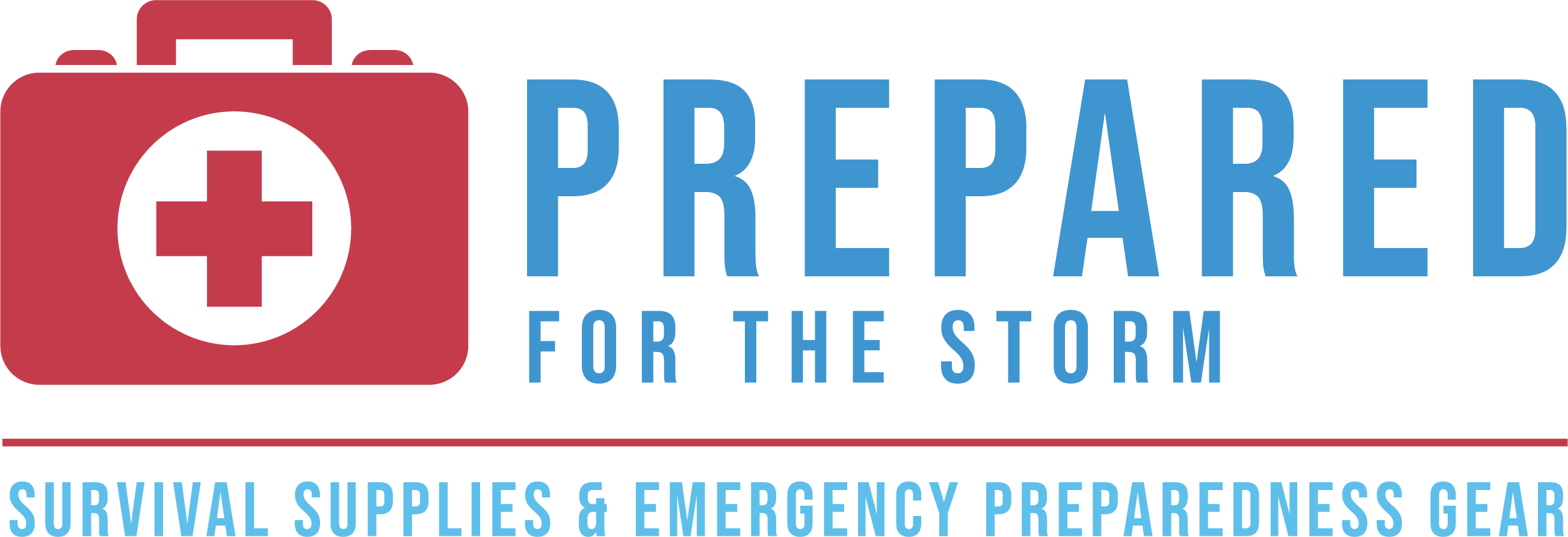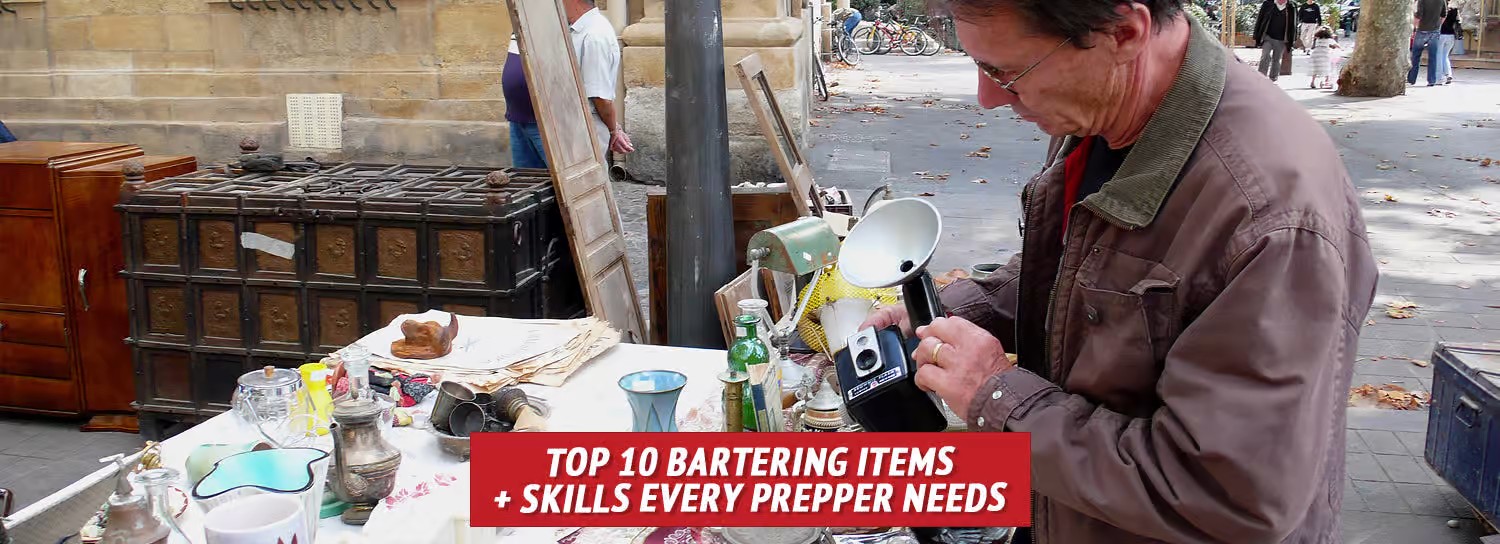If economic times get even harder or SHTF and we find ourselves living in a collapsed society, we’ll have to rely on the items and skills we already have.
Grocery stores may be shuttered. Supply chains will likely be cut off. Roads could be unmanageable. Threats will pop up on every corner.
What we have and what we can do will become the key to our survival.
You’ll want to be as self-sufficient as possible – and NOT depend on anyone else. And you may need to barter your way to survival.
Bartering has proven a helpful way to stay alive throughout history, even in grim situations.
Bartering in History and TODAY
Living History Farm recorded an interview with Great Depression survivor Walter Schmitt, who said, “[He] remembers a time when his blacksmith shop accepted payment in the form of potatoes.”
In another interview, Helen Bolton remembers “paying the doctor with corn that was worth 10-cents a bushel at the time. The doctor was able to hold on to it until the price rose to 50-cents a bushel. According to Helen, ‘They made a good profit.’”
During WWII, Allied prisoners of war in Germany used bartering to obtain essentials.
The National Library reports, “As Allied prisoners of war in Germany were billeted in barns for the night they quickly scattered through the village searching for food. They bartered with German civilians, and for English cigarettes, soap and chocolate, were able to get fresh vegetables, milk and occasionally meat. This was very important as the health of some of the men who had been prisoners since Norway, Dunkirk and Greece was very low and food was definitely beneficial to them, enabling to maintain 20-25 miles per day forced on them by their Nazi guards.”
Most recently, Venezuela has seen a surge in the value of everyday items, and many citizens now rely on bartering to meet their basic needs.
Ukraine’s food exporters are bartering as the war has made it impossible to pay suppliers with cash. Instead, food exporters are bartering supplies, fodder, and other ingredients in exchange for products to distribute to workers.
Possessing sought-after items will prove important if things go south. So will having valued skills. Keep reading for 10 barter items and skills that will help you sustain your family in any survival situation.
1. Vices
There’s a reason we’re mentioning this first. If there’s one thing history has shown us, it’s that vices do not lose their value. People don’t just stop drinking coffee or alcohol or smoking tobacco because times get tough. In fact, these vice items become more valuable in times of crisis—especially alcohol.
Some people have an addiction to feed. Others may want to take the edge off or drown their sorrows. But for a majority of people, they’ll want it because it’s a key survival tool and can be used for a range of things like treating wounds and starting fires.
[Related Read: 6 Surprising Life-Saving Uses for Alcohol during a Crisis]
2. Honey

Local, raw honey can be used in many ways. Not only can it be applied as a sweetener, but it also works medicinally. Honey is a natural antibiotic and helps with allergies. It can also be used in lieu of Neosporin.
SKILL – Beekeeping
One way to ensure you have a steady stream of honey for bartering is to keep bees. In addition to honey, bees are essential for pollination and fertilization, which is important if you have crops or gardens. You can also use beeswax to make candles, lotions, and lip balms for bartering.
3. Salt
When thinking of items to barter, many people forget about salt. This is a huge mistake.
Salt has been coveted throughout history. Roman soldiers’ salaries were paid in salt. Venice’s wealth was attributed to trading commonplace salt. And cakes of salt were used as money in parts of central Africa.
It’s valuable because of its multitude of uses: it seasons food, preserves meat and fish, cleans stains, controls fires, eases sore throats, and heals wounds.
[Related Read: Salt: The Survival Essential in Everyone’s Pantry]
4. Canning Lids

Canning is an excellent way to preserve food and ensure none goes to waste—and to have a valuable item to barter. But most canning lids cannot be used more than once. This will put them in high demand. There are canning lids on the market that you can reuse. Stock up on these now so you can barter them later—and ensure you have lids to continually preserve food.
SKILL – Master Canning
If you are stocking up on canning equipment, you might as well learn how to use it before it becomes a necessity. Should you need it, you can barter this skill and preserve food for neighbors in exchange for food or other items.
5. Cleaning and Sanitation Supplies
We all experienced firsthand the great toilet paper fiasco of 2020. It taught us that people will do desperate things for toilet paper.
When it goes on sale, stock up.
While you’re at it, stock up on cleaning supplies that will be in demand, such as bleach, baking soda, and vinegar.
6. Seeds
Even now, we are seeing seeds growing in demand and popularity. They are a valuable commodity because they ensure you can grow and eat your own food. Start creating a survival seed bank today. Make sure the seeds are non-GMO and that you’ve labeled them properly. Should you need to, you could barter seeds or the veggies you harvest.
SKILL – Planting and Harvesting
It’s a little pointless to simply stockpile seeds if you don’t know what to do with them. Instead of waiting for things to get worse before you plant, make an effort to learn how to plant seeds today. Take it up a notch and learn how to harvest seeds to ensure you always have seeds for your garden.
7. Toiletries
Toiletries, such as soap, shampoo, laundry detergent, toothpaste, and tampons, are essential—and should times get tough, they will be highly sought-after. Stock up today on these items and any other essential toiletries (especially those with a long shelf life).
SKILL – Make Your Own Soaps
Like other products on the list above, your stock will eventually dwindle. The best way to prepare is to be self-sufficient and know how to make your own soaps, shampoos, toothpaste, and laundry detergents. Not only will this enable you to keep your family clean, but it will provide another useful resource for bartering.
8. Medication

Basic over-the-counter medications will be in high demand. Imagine getting a headache or an upset stomach and not having medicine. That’s what will happen if you haven’t stocked up, supply chains go down, and you can’t walk into your local pharmacy to get what you need. You would be willing to barter with a neighbor to obtain essential medication, wouldn’t you?
Since you know you’d be willing to do so, so will others. Purchase bulk bottles of acetaminophen and other essential medications for bartering.
SKILL – Create Medicinal Tinctures
In addition to knowing basic first aid, knowing how to make medicinal tinctures will come in handy should medications get way too expensive or if store shelves are empty. You’ll be able to help your neighbor in a time of need and barter medicinal tinctures.
Remember the earlier mention of stocking up on vices like alcohol for bartering? You can also use alcohol to make tinctures. See Why You Need Alcohol in Your Emergency Stockpile.
9. Building Supplies
If you can’t go to a grocery store, chances are you won’t be able to go to a hardware store either. This means any fixing or building will be dependent on the building supplies you already own.
Stock up on all the building supplies you may need like nails, screws, and hammers. Chances are, if you need them, someone else will, too. If you stock up on extras now, you’ll be able to barter them later.
SKILL – Fine-Tune Your Handyman Skills
Don’t stop at stocking up on building supplies. Learn how to do different handy tasks. Your neighbors will be willing to barter for your plumbing and roofing experience. If you can build a chicken coop or mend a fence, you will be in high demand—and that’s worth its weight in gold when SHTF.
10. Food
Scout readers know we always recommend having a long-term emergency food pantry.
However, if things go south for an extended period of time, your emergency food supply will eventually run out. As such, food will become a major bartering item. Just like during the Great Depression, people will be willing to trade almost anything for food.
SKILL – Gardening, Farming, Hunting, Fishing, Breadmaking, Etc.
You don’t want to barter your long-term emergency food. Instead, develop a skill that allows you to find, grow, or make food for bartering. This is where it will come in very handy to know how to garden, fish, hunt, preserve foods, make breads—anything to continually produce food for feeding your family and bartering.
Think ahead, friends…think ahead.
In liberty,
Elizabeth Anderson
Preparedness Advisor, Prepared For The Storm

